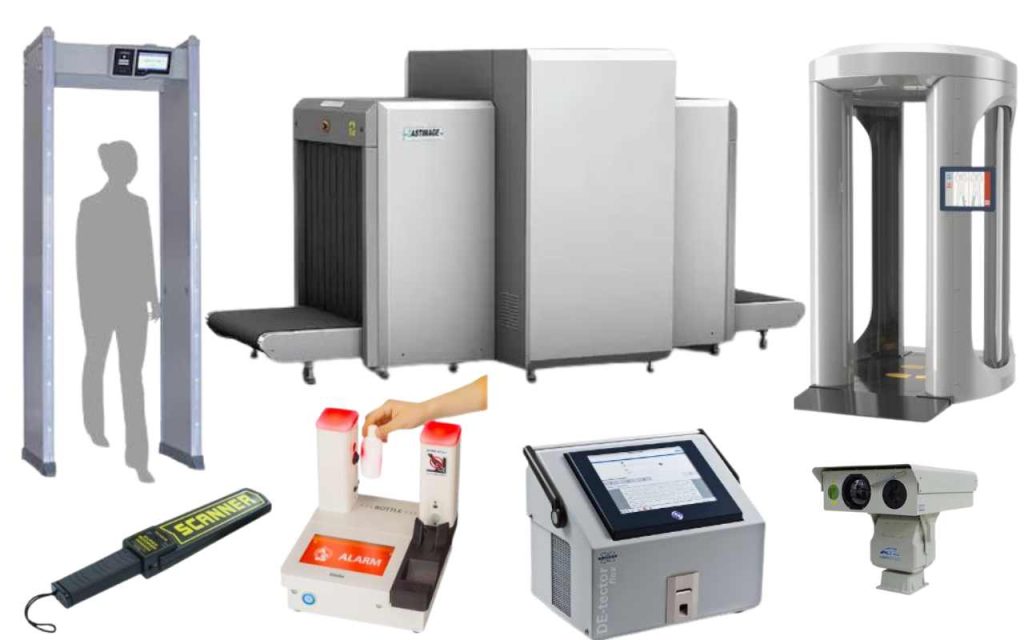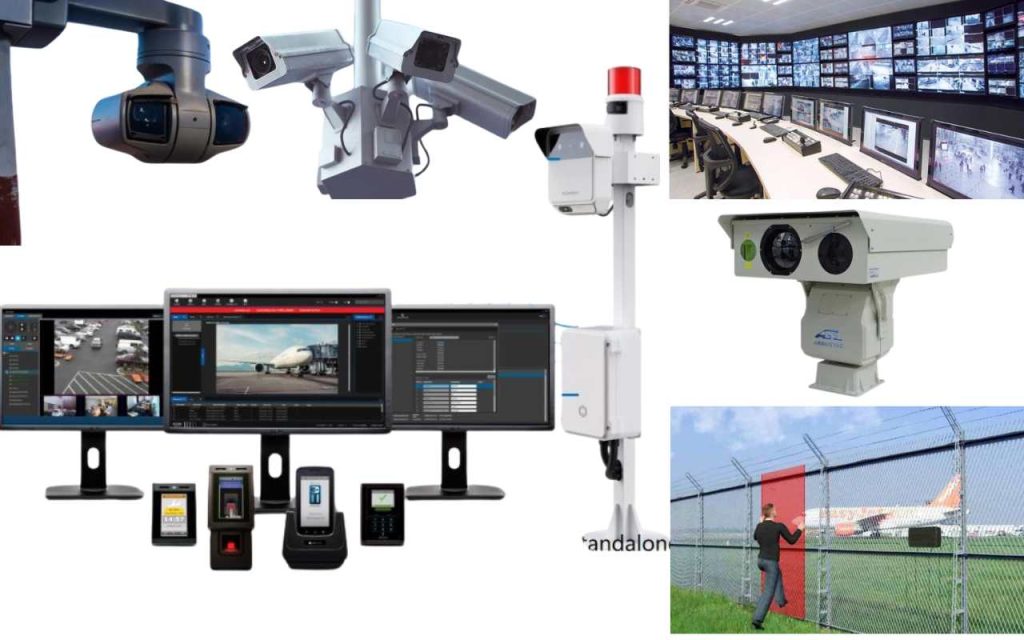Exploring Airport Security Systems in Germany in 2025
Germany, a nation synonymous with precision engineering and innovation, takes its airport security very seriously. Here, we embark on a captivating exploration of the state-of-the-art security systems that safeguard German airports, ensuring the safety of millions of passengers every year. From the high-tech wizardry of X-ray scanners to the silent vigilance of CCTV networks, we’ll delve into the fascinating world of aviation security solutions employed by German airports.

A Symphony of Security Technologies
German airport security is a meticulously orchestrated performance, each component playing a vital role in the grand scheme. Let’s meet the key players in this security orchestra:
- Aviation security equipment suppliers and manufacturers: Renowned German companies like Rohde & Schwarz and Smiths Detection are at the forefront of developing and supplying cutting-edge security equipment, from X-ray scanners to explosive detection systems (EDS). These providers are the backbone of German airport security, ensuring a steady flow of innovative technologies.
- X-ray scanners: These ubiquitous machines are the workhorses of baggage screening. Using advanced dual-energy technology, they create detailed digital images of your luggage, allowing security personnel to identify potential threats with remarkable accuracy.
- Body scanners: Millimeter wave scanners, also known as millimeter wave imaging (MMWI) systems, are increasingly being used for passenger screening. These scanners emit low-level electromagnetic waves that can detect objects concealed beneath clothing, enhancing security without physical contact.
- Metal detectors: The classic sentinels of security checkpoints, metal detectors remain a crucial layer of defense. They efficiently identify metallic objects that could pose a threat, ensuring a smooth and secure flow of passengers.
- Explosive detection systems (EDS): These sophisticated systems utilize various techniques, such as X-ray analysis and chemical sniffing, to detect explosives and other hazardous materials hidden within baggage. EDS plays a critical role in preventing catastrophic incidents.
- Baggage handling systems: While often overlooked, baggage handling systems are an integral part of airport security. These automated networks of conveyor belts and sorting machines ensure efficient luggage screening, keeping wait times down and security measures streamlined.
- CCTV (Closed-circuit television) surveillance systems: A watchful eye is cast upon every corner of the airport by a network of strategically placed CCTV cameras. These systems provide real-time footage, allowing security personnel to monitor passenger activity and deter potential threats. Advanced video analytics software can further enhance security by automatically detecting suspicious behavior.
- Access control systems: Protecting secure areas within the airport is the domain of access control systems. These systems employ key cards, biometric authentication (fingerprint or iris scans), or even facial recognition to grant access only to authorized personnel.
A Multifaceted Approach to Security
German airport security goes beyond just sophisticated equipment. It’s a comprehensive strategy encompassing various measures:
- Passenger screening: This includes checks of travel documents, security checks with metal detectors and body scanners, and baggage screening with X-ray scanners and EDS.
- Baggage screening: As mentioned earlier, baggage screening is a multi-layered process involving X-ray scanners, EDS, and in some cases, physical inspection.
- Cargo screening: Just like passenger luggage, cargo undergoes rigorous screening procedures to ensure the safety of flights and the prevention of illegal items entering the country.
- Perimeter security: The airport perimeter is meticulously secured with fences, intrusion detection systems, and security patrols. This ensures unauthorized access is prevented, safeguarding the entire airport complex.
- Cyber security: In today’s digital age, cyber security is paramount. German airports invest heavily in robust cyber defense systems to protect their critical infrastructure from cyberattacks.
- Threat detection and risk assessment: Security personnel undergo rigorous training to identify potential threats and assess risks. This proactive approach allows them to effectively respond to any security incidents.
Following the Global Chorus of Security Regulations
German airport security adheres to a stringent set of regulations established by international organizations like the Transportation Security Administration (TSA) and the International Civil Aviation Organization (ICAO). These regulations ensure a standardized approach to aviation security across the globe, promoting passenger safety and fostering international cooperation.
The Melodious Harmony of Security and Efficiency
The ultimate goal of German airport security is not just enhanced security but also an efficient and seamless passenger experience. Here’s how these advanced systems achieve this delicate balance:
- Reduced wait times: Sophisticated screening technologies like X-ray scanners with automated threat detection and advanced conveyor belt systems in baggage handling significantly reduce wait times at security checkpoints.
- Increased efficiency: Automation plays a key role in streamlining security procedures. From automated access control systems to baggage handling networks, technology frees up security personnel to focus on more complex tasks, improving overall efficiency.
Airport Security Systems Price list
- Customization: Airport security systems are highly customized based on the specific needs and size of the airport. A small regional airport will have vastly different security needs compared to a major international hub.
- Complex Packages: Security solutions are rarely sold as individual components. They are typically offered as comprehensive packages that include equipment, installation, training, and maintenance. The cost of these packages can vary significantly depending on the specific technologies included and the level of service required.
- Sensitive Information: Pricing for security equipment and services is often considered sensitive information by vendors. They may be hesitant to publicly disclose specific costs.
However, I can offer some insights into the general pricing structure:
- X-ray Scanners: Prices can range from €50,000 to €200,000+ depending on the size, capabilities, and brand of the scanner.
- Body Scanners: Millimeter wave scanners typically cost in the range of €100,000 to €300,000+.
- Metal Detectors: These are generally the most affordable security systems, with basic models starting around €5,000 and advanced models reaching €20,000+.
- Explosive Detection Systems (EDS): EDS systems represent a significant investment, with costs ranging from €200,000 to €1 million+ depending on the technology employed.
- CCTV Systems: The cost of CCTV systems varies greatly depending on the number of cameras, their quality, storage solutions, and video analytics software. A basic system with a few cameras might cost around €10,000, while a sophisticated network with advanced features can reach €100,000+.
- Access Control Systems: Similar to CCTV, access control system pricing depends on the complexity of the system. Basic keycard systems might start around €5,000, while biometric authentication systems can reach €50,000+.

Get a Quote from Top 12 Global Leader Security Systems Manufacturers
FAQ
Are X-ray scanners in German airports safe?
Yes, X-ray scanners in German airports utilize low-dose radiation considered safe for passengers by international health organizations.
What happens if my belongings trigger the alarm at security in a German airport?
Security personnel will conduct a closer inspection of your belongings. This may involve opening your bag or using a handheld metal detector.
Are there any items banned from carry-on luggage in German airports?
Absolutely! Liquids exceeding 100ml, gels, and certain pastes are restricted. Sharp objects, firearms, and explosives are strictly prohibited. Always check the latest regulations before packing.











